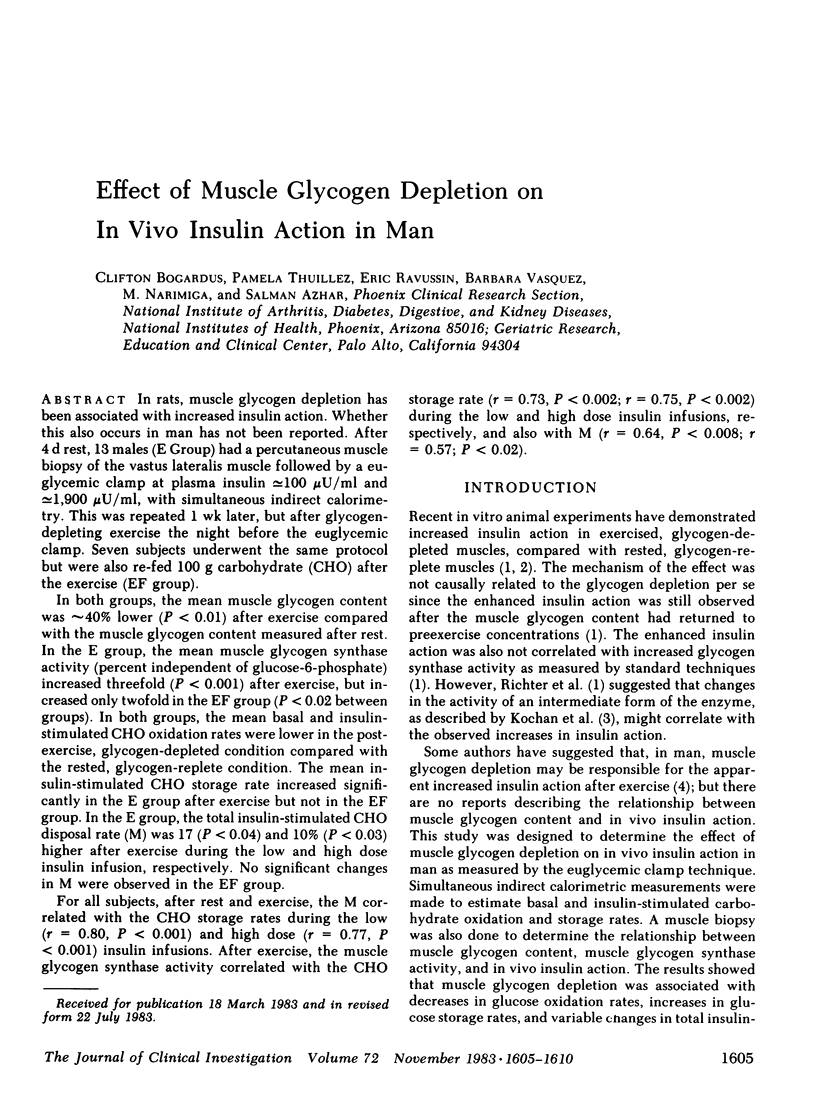Abstract
In rats, muscle glycogen depletion has been associated with increased insulin action. Whether this also occurs in man has not been reported. After 4 d rest, 13 males (E Group) had a percutaneous muscle biopsy of the vastus lateralis muscle followed by a euglycemic clamp at plasma insulin congruent to 100 microU/ml and congruent to 1,900 microU/ml, with simultaneous indirect calorimetry. This was repeated 1 wk later, but after glycogen-depleting exercise the night before the euglycemic clamp. Seven subjects underwent the same protocol but were also re-fed 100 g carbohydrate (CHO) after the exercise (EF group). In both groups, the mean muscle glycogen content was approximately 40% lower (P less than 0.01) after exercise compared with the muscle glycogen content measured after rest. In the E group, the mean muscle glycogen synthase activity (percent independent of glucose-6-phosphate) increased threefold (P less than 0.001) after exercise, but increased only twofold in the EF group (P less than 0.02 between groups). In both groups, the mean basal and insulin-stimulated CHO oxidation rates were lower in the post-exercise, glycogen-depleted condition compared with the rested, glycogen-replete condition. The mean insulin-stimulated CHO storage rate increased significantly in the E group after exercise but not in the EF group. In the E group, the total insulin-stimulated CHO disposal rate (M) was 17 (P less than 0.04) and 10% (P less than 0.03) higher after exercise during the low and high dose insulin infusion, respectively. No significant changes in M were observed in the EF group. For all subjects, after rest and exercise, the M correlated with the CHO storage rates during the low (r = 0.80, P less than 0.001) and high dose (r = 0.77, P less than 0.001) insulin infusions. After exercise, the muscle glycogen synthase activity correlated with the CHO storage rate (r = 0.73, P less than 0.002; r = 0.75, P less than 0.002) during the low and high dose insulin infusions, respectively, and also with M (r = 0.64, P less than 0.008; r = 0.57; P less than 0.02).
Full text
PDF





Selected References
These references are in PubMed. This may not be the complete list of references from this article.
- Best J. D., Judzewitsch R. G., Pfeifer M. A., Beard J. C., Halter J. B., Porte D., Jr The effect of chronic sulfonylurea therapy on hepatic glucose production in non-insulin-dependent diabetes. Diabetes. 1982 Apr;31(4 Pt 1):333–338. doi: 10.2337/diab.31.4.333. [DOI] [PubMed] [Google Scholar]
- Bogardus C., LaGrange B. M., Horton E. S., Sims E. A. Comparison of carbohydrate-containing and carbohydrate-restricted hypocaloric diets in the treatment of obesity. Endurance and metabolic fuel homeostasis during strenuous exercise. J Clin Invest. 1981 Aug;68(2):399–404. doi: 10.1172/JCI110268. [DOI] [PMC free article] [PubMed] [Google Scholar]
- DeFronzo R. A., Jacot E., Jequier E., Maeder E., Wahren J., Felber J. P. The effect of insulin on the disposal of intravenous glucose. Results from indirect calorimetry and hepatic and femoral venous catheterization. Diabetes. 1981 Dec;30(12):1000–1007. doi: 10.2337/diab.30.12.1000. [DOI] [PubMed] [Google Scholar]
- Fell R. D., Terblanche S. E., Ivy J. L., Young J. C., Holloszy J. O. Effect of muscle glycogen content on glucose uptake following exercise. J Appl Physiol Respir Environ Exerc Physiol. 1982 Feb;52(2):434–437. doi: 10.1152/jappl.1982.52.2.434. [DOI] [PubMed] [Google Scholar]
- Fortuin N. J., Weiss J. L. Exercise stress testing. Circulation. 1977 Nov;56(5):699–712. doi: 10.1161/01.cir.56.5.699. [DOI] [PubMed] [Google Scholar]
- Herbert V., Lau K. S., Gottlieb C. W., Bleicher S. J. Coated charcoal immunoassay of insulin. J Clin Endocrinol Metab. 1965 Oct;25(10):1375–1384. doi: 10.1210/jcem-25-10-1375. [DOI] [PubMed] [Google Scholar]
- Kochan R. G., Lamb D. R., Lutz S. A., Perrill C. V., Reimann E. M., Schlender K. K. Glycogen synthase activation in human skeletal muscle: effects of diet and exercise. Am J Physiol. 1979 Jun;236(6):E660–E666. doi: 10.1152/ajpendo.1979.236.6.E660. [DOI] [PubMed] [Google Scholar]
- Kroll J. Lysis of 131-I-labelled plasma clots in human subcutaneous tissue in vivo. Scand J Clin Lab Invest. 1967;19(1):1–3. doi: 10.3109/00365516709093475. [DOI] [PubMed] [Google Scholar]
- Lukaski H. C., Mendez J., Buskirk E. R., Cohn S. H. A comparison of methods of assessment of body composition including neutron activation analysis of total body nitrogen. Metabolism. 1981 Aug;30(8):777–782. doi: 10.1016/0026-0495(81)90023-8. [DOI] [PubMed] [Google Scholar]
- Richter E. A., Garetto L. P., Goodman M. N., Ruderman N. B. Muscle glucose metabolism following exercise in the rat: increased sensitivity to insulin. J Clin Invest. 1982 Apr;69(4):785–793. doi: 10.1172/JCI110517. [DOI] [PMC free article] [PubMed] [Google Scholar]
- Rousselle J., Bückert A., Pahud P., Jéquier E., Felber J. P. Relationship between glucose oxidation and glucose tolerance in man. Metabolism. 1982 Sep;31(9):866–870. doi: 10.1016/0026-0495(82)90174-3. [DOI] [PubMed] [Google Scholar]
- STEELE R. Influences of glucose loading and of injected insulin on hepatic glucose output. Ann N Y Acad Sci. 1959 Sep 25;82:420–430. doi: 10.1111/j.1749-6632.1959.tb44923.x. [DOI] [PubMed] [Google Scholar]
- Thomas J. A., Schlender K. K., Larner J. A rapid filter paper assay for UDPglucose-glycogen glucosyltransferase, including an improved biosynthesis of UDP-14C-glucose. Anal Biochem. 1968 Oct 24;25(1):486–499. doi: 10.1016/0003-2697(68)90127-9. [DOI] [PubMed] [Google Scholar]
- Wahren J., Felig P., Hagenfeldt L. Physical exercise and fuel homeostasis in diabetes mellitus. Diabetologia. 1978 Apr;14(4):213–222. doi: 10.1007/BF01219419. [DOI] [PubMed] [Google Scholar]
- YALOW R. S., BERSON S. A. Immunoassay of endogenous plasma insulin in man. J Clin Invest. 1960 Jul;39:1157–1175. doi: 10.1172/JCI104130. [DOI] [PMC free article] [PubMed] [Google Scholar]



